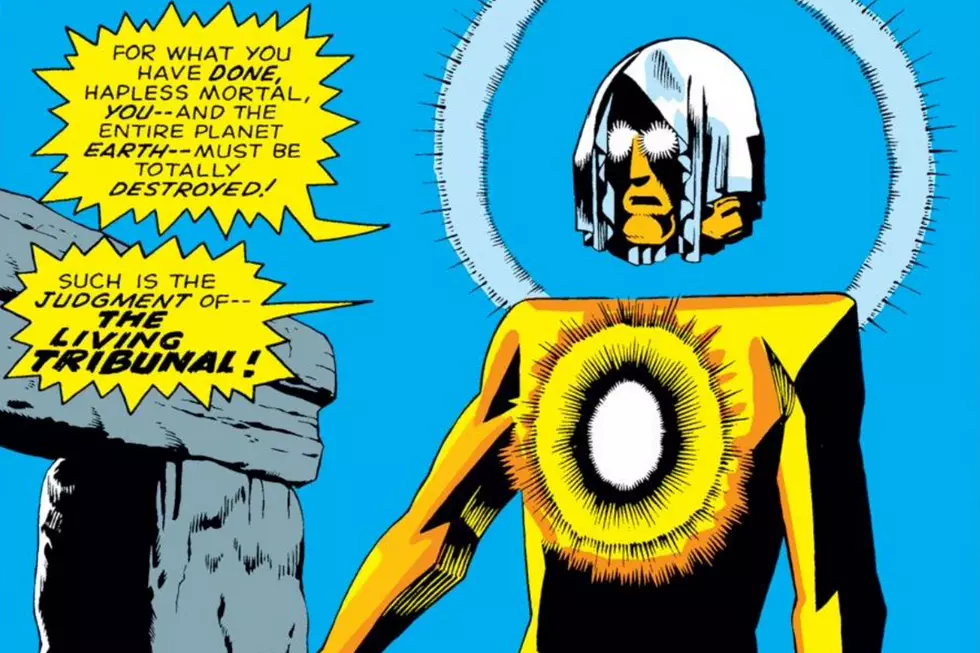
Hot Ink — Strange Tales, Incognito, Sweet Tooth, Northlanders
MR. MOUSE, MEET YOUR NEW FRIENDS Strange Tales #1/Incognito #6

The phrase "jiggling, voluptuous chaos that is the human female form" is probably not the first thing most of you think about when Disney is mentioned. I recognize that for some of you, this is in fact exactly the first thing you think of when Disney is mentioned, and I am trying my hardest not to judge you for it because this is a great big world and it takes all kinds to make it go round.
But the point I'm getting at here is that Disney probably does not want that to be the kind of thing you think of first, second, two hundred and twenty-fifth, or indeed at all when their brand name is brought up. So when that sentence appeared on page 1, panel 3 of "Strange Tales" #1, as we catch Uatu the Watcher ogling a showering She-Hulk and then quickly rationalizing to the audience, I couldn't help but wonder at the bizarre twist of fate that led to Marvel's long-awaited indie comics creators anthology hitting shelves the same week they were purchased by one of the world's biggest media empires.
Seeing that first page, I had some concerns. Was this, I wondered, a high water mark of Marvel's experimentation that would not be seen again for some time? There's been much talk of Disney's purchase of Marvel being similar to its purchase of Pixar, with Marvel retaining its staff and being allowed to continue making its own creative decisions. But at the same time, Disney's paid a lot of money for Marvel and expects to make that money back on licensing, film franchises and video games while bringing in more of the younger male demographic than their line of characters usually is able to. Could that mean, over the long run, a focus on comics that could reap those rewards and therefore less of a desire to experiment on more out there ideas like "Strange Tales"?Then I read the rest of the book, took several deep breaths, and calmed down.
"Strange Tales" #1 is not just a lot of fun, but the more I read of it the more I realized that my first impressions were off, and that this was the sort of book Disney would probably be happy to have published by one of its companies. These stories should appeal to Marvel fans young and old at the same time. I really enjoyed Dash Shaw's "Dr. Strange," in which the dramatic tension is ratcheted up for acts both mystically spectacular and incredibly mundane.
Also worth noting are Paul Pope's "Inhumans," featuring the trials of an ever-more-frustrated Lockjaw, Johnny Ryan's "The Punisher," who uses his own trademark brand of encouragement on a homework-neglecting student, and Nick Bertozzi's MODOK story, tracing a relationship between the enormous-headed supervillain and a loyal AIM scientist over several decades.
With the possible exception of Bertozzi, each of the stories are all-ages appropriate. And as far as licensing goes, Disney/Marvel could do a lot worse than slapping the designs of Junko Mizuno's Spider-Man and James Kochalka's Incredible Hulk on shirts, lunch boxes, and posters and watching them fly off shelves. So in summary, not only did this book make me feel good about having chosen to read this book, it made me feel a lot better about the possibility of Marvel being able to keep strong creative control, experiment, and come up with a result that satisfies everyone, including readers.
And then there's the little matter of "Incognito" #6. If Strange Tales is an example of an experimental, slightly out there product that I can't imagine Disney having any sort of problem with, I can't say the same about Ed Brubaker and Sean Phillips' miniseries published under Marvel's Icon imprint. When page 2 opens with a close up of the villain punching a man so hard his head explodes, and then follows with a witness screaming so loudly that she's shot to shut her up, it's safe to say the possibility of this being a delightful family friendly romp has been left behind.
And when the hero is a barely reformed supervillain who takes tremendous joy in killing people and in a previous issue arguably took sexual advantage of a woman with serious emotional problems, I'm gonna guess they're aren't going to be any plans to put this guy on a lunch box anytime soon. I hope my fears are unfounded, because "Incognito," now completed with its sixth and final issue, is currently my favorite series of the year. Brubaker's ability to create complex, layered characters is on full display here as it has been throughout the run, in heroes, villains, and the innocent bystanders caught in between. And Sean Phillips' art sets exactly the right tone for the book's pulp and noir inspirations.
Yet there's a little part of me that's worried there could be fewer opportunities for books like this at Marvel in a few years time. Icon is Marvel's creator-owned line, a perk for some of its preferred writers who would otherwise have to look to another company to publish books with characters of their own invention. I'm no entertainment lawyer, but if Disney's motivation is to make as much money off licensing and movie deals as possible, then offering creator-owned titles would not seem to be high on their list of priorities.
I don't imagine they're going to come in and kill Icon any time in the near future. But combine the facts that it won't make them as much money, it publishes books that skew ever so slightly older than the age demographic they're looking for, and the problem of never knowing when some parent might accidentally buy their nine-year old an inappropriate Icon book and then make a media fuss over it because, "hey, all comic books are supposed to be for kids, right?" and I don't really think Disney would miss Icon at all if it simply disappeared.
So while I'm not at all worried about the rest of Marvel's line, this is the one place I would say I'm slightly concerned about where it will be in four or five years from now, perhaps after some of the current Marvel higher ups have made decisions to move on to something else and new people with somewhat different priorities are in place. I hope my concerns are unfounded and it stays, because Icon's produced some of my favorite books Marvel's published since the imprint's creation five years ago.
AT LEAST THERE'S STILL CHOCOLATE AFTER THE APOCALYPSE -- Sweet Tooth #1
 If popular culture has taught me anything, and it most certainly has, then one of the foremost lessons I have learned is that there is no quicker path to misery and an eventual tragic death than to have children. And God help if you there's something special about that child, or if they perhaps have a whiff of destiny about them. Issue 1 of "Sweet Tooth," Jeff Lemire's new Vertigo series, is yet another reinforcer of this lesson.
If popular culture has taught me anything, and it most certainly has, then one of the foremost lessons I have learned is that there is no quicker path to misery and an eventual tragic death than to have children. And God help if you there's something special about that child, or if they perhaps have a whiff of destiny about them. Issue 1 of "Sweet Tooth," Jeff Lemire's new Vertigo series, is yet another reinforcer of this lesson.
The first issue introduces us to Gus, an innocent young boy living in a post-apocalyptic world, a hybrid human with the ears and antlers of a deer. This makes him immune to the infection slowly killing off the rest of humanity. As for Gus' run of the mill human father, who dearly loves the boy and would do anything to protect him, he inevitably ends up dead and in the ground before the first issue concludes. And so Gus is left to find his own place in the world, to face danger by himself. And it doesn't wait around for him to go looking for it, happening upon him without even giving him much time to grieve.
In his first issue, Lemire succeeds at instantly creating the atmosphere of the forsaken world where "Sweet Tooth" takes place while giving minimal exposition about how the world came to be that way. The reader's exposure to the w
orld parallels that of Gus, who knows nothing of what lies beyond the fences of the old wildlife sanctuary where he and his father live. There's a sense that we'll be discovering the outside world with him, and so all the curiosity, the fear, and the wonder he experiences is easy for us to share with him. Combined with Gus' sweetness and innocence, he's quickly endearing and it's difficult not to find yourself caring about what's going to happen to him next. A promising start to what has the potential to be a good series.
STAY OFF HIS LAWN -- Northlanders #20
 If you reach "happily ever after" and then keep following the story for long enough, you're eventually going to find tragedy. Heroes age; they grow weak; they find it harder and harder to protect the life they've built for themselves and prevent harm from touching their loved ones. This idea is the center of issue 20 of Brian Wood's "Northlanders."
If you reach "happily ever after" and then keep following the story for long enough, you're eventually going to find tragedy. Heroes age; they grow weak; they find it harder and harder to protect the life they've built for themselves and prevent harm from touching their loved ones. This idea is the center of issue 20 of Brian Wood's "Northlanders."
Up until this point, "Northlanders" has been a set of stand alone story arcs and single issues, introducing readers to a new protagonist in a new era and setting while still sticking to the connecting thread of Viking history. That changes with issue 20, as Wood, along with artist Davide Gianfelice, return to the story of Sven of Orkney, last seen when his tale of homecoming and revenge ended in issue 6.
In "Sven the Immortal" we find a much older Sven, with his wife and young children in the Faroe Islands, trying to live a quiet life. The problem is that tales have been told far and wide of Sven's exploits, making him a famous figure. Naturally, others want to bask in that fame. This being the 11th century, following Sven on Twitter isn't a possibility. So the next best option? Form a war party with you and a couple friends, find Sven, and kill him.
Wood creates a stark contrast between the Vikings, seven young men on a boat, callous, and fully prepared to kill a complete stranger for no reason more than fun and fame, and Sven, old, grim, simply looking to find a way for himself and his family to keep surviving in the face of this attack, one he'd fully expected to come his way as a result of his notoriety.
Here, heroism and glory are pastimes of the young, those who've got nothing to lose and no one counting on them coming back alive. Sven, on the other hand, is left only with difficult choices to make about what he can risk losing and what he must do to protect the little life he's worked so hard to build. I found myself rooting harder for Sven, the old man looking to preserve the small shack he'd built for his family, than I previously had for Sven, the young man who came home to avenge his father's death and retake control of his village. Even though his goals are far more modest, this Sven has far more to lose. It's a well-executed deconstruction of the victorious hero, who can never truly put away his sword and feel safe no matter how many battles he has won.
THEY'RE STILL GOOD, AND YOU SHOULD STILL BE READING THEM - Chew and Irredeemable
In previous reviews I've praised John Layman and Rob Guillory's "Chew" and Mark Waid and Peter Krause's "Irredeemable." Chew #4 and Irredeemable #6 are both out this week, and both issues are fully deserving of past compliments I've paid to each series. Go pick 'em up.
More From ComicsAlliance




![A Happy Ending for ‘Sweet Tooth’, ‘Punk Rock Jesus’… And The Return Of Neil Gaiman’s ‘Sandman’ [Vertigo Panel [SDCC]](http://townsquare.media/site/622/files/2012/07/newsandmanstuff.jpg?w=980&q=75)
![Ed Brubaker & Sean Phillips Play With Familiar Tropes in ‘Fatale’ [Interview]](http://townsquare.media/site/622/files/2012/05/seanphillips-fatale-top.png?w=980&q=75)



